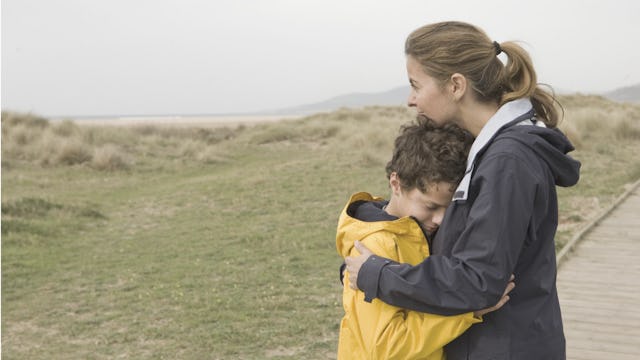We Feel Our Kids' Feelings, And It's Exhausting

Parenting is wonderful, but it’s hard. There’s just no way around it. Between the sleep deprivation, the constant noise and mess, the feeding and grooming, the education and training, and the inevitable challenges that arise from tiny people learning how to be humans, being a mom or dad is no small feat. It’s a long, grueling marathon where the scenery is stunning and the endorphin high makes it all worth it, but it’s definitely hard work.
There’s one challenging aspect of parenting that I had never considered, though, something that has been a part of every age and stage of my children’s lives, a phenomenon that we parents don’t talk about nearly often enough.
I refer to it as parental empathy—the second-hand feelings you experience when your child is sad, hurting, frustrated, or afraid.
I swear our emotions and psyches are inextricably linked with our children’s in some deep, cosmic way. What they feel, we feel. What they experience, we experience. We may not feel or experience what they do to the same degree or with the same intensity, but parental empathy is real. And it’s freaking exhausting.
I notice it a lot now that my kids are older, but looking back, I realize it started when my first child was a newborn. When she would cry inconsolably during the witching hour, it wasn’t just frustration at my own exhaustion and helplessness I felt—it was also the emotional energy coursing through the invisible cord that connected me to her. Her anguish flowed directly into and through me.
One day, I accidentally leaned over too far with her in the baby sling and whacked her face on the fireplace mantle. I swear I could feel my own cheek sting in the same place hers started to swell.
The first time my son got left out by friends. The time my other daughter got embarrassed in front of a crowd. When our first pet died. Helping them handle their grandmother’s unexpected pancreatic cancer diagnosis. Every disappointment, every broken heart, every bit of grief my kids go through hit me right in the gut. I hurt for them. I ache for them. I feel their pain in a very real way.
Anxiety runs through our family on both sides, though it mostly skipped over me. When it hits my kids, though, I feel it. When they’re feeling panicky or shaky or afraid of life in general, I can put myself into their shoes and see the world through their anxious eyes. I’m grateful in some ways for that ability, as it helps me remember how hard it is to be a kid, how big every emotion feels when you’re young, and how much emotional work it takes to overcome difficult and unpredictable feelings like fear and anxiety. But at the same time, it sucks.
Sometimes it’s just too much. While I’m experiencing all of these feelings on my kids’ behalf, I also have the full spectrum of my own adult human emotions to deal with at the same time. If it were just a matter of managing my kids’ second-hand emotions, it wouldn’t be so hard. But when their feelings get piled on top of my own, the weight of it all can feel like it’s going to crush me.
It’s not all bad, however. Parental empathy doesn’t just apply to difficult emotions. I also feel my kids’ excitement, joy, and triumph. There is nothing better than feeling that thrill as my children overcome a challenge, or being so taken away by the beauty and wonder of an experience that their faces light up with pure happiness.
I feel their “good” emotions as much as I feel the “bad” ones. Perhaps that’s part of why we feel compelled to want our children to be happy—not only because we don’t want to see them suffer, but because we don’t want to suffer vicariously through them. I’d much rather experience my children’s joy than their pain.
Being parents makes us more fully human, I think. Our understanding of the range of human experience grows as we feel for our children. Our ability to empathize with all people expands if we pay attention to what we can learn from empathizing with our kids. Not all parents feel empathy as strongly as others, I’m sure, but I don’t know how any parent couldn’t feel at least a little tug on their own heart when their child feels broken-hearted.
However, we do have to try to stay somewhat detached from our kids’ emotions, even as we retain a sense of compassion for them. Empathy can take a lot out of us, and our kids need our strength as much as they need our sympathy. It’s a balance that’s not always easy to find, but I think our kids benefit from getting both from us.
If anyone figures out how to do that effectively, let me know, because with seventeen years of parental empathy under my belt, I’m not sure if I have the emotional energy to do anything anymore.